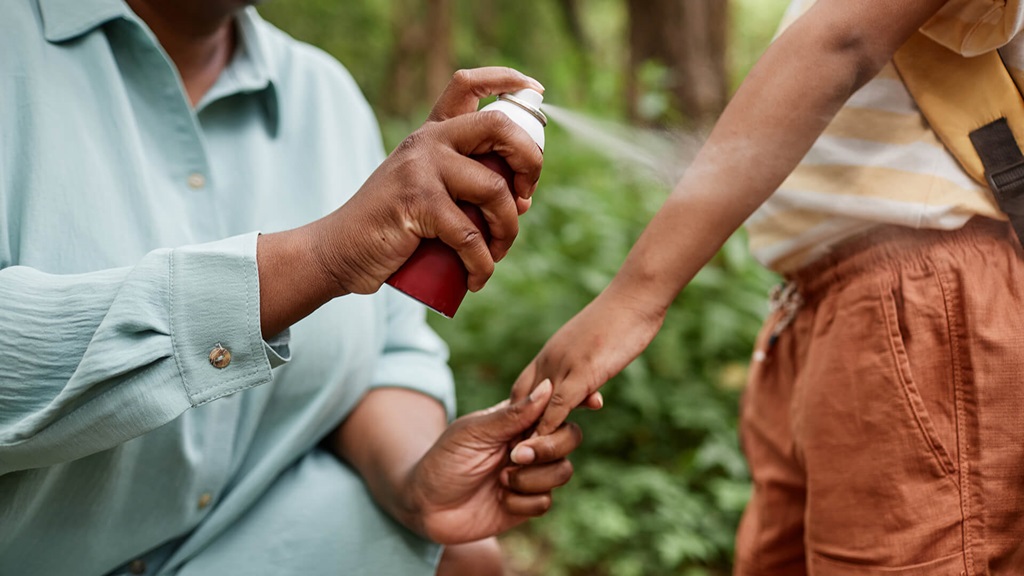Summer is a time of outdoor adventure, sunny days, and backyard play. But along with warm weather comes an increase in bugs—mosquitoes, ticks, bees, fleas, and more. While some creepy crawlers may be harmless, others can bring irritation, allergic reactions, or even disease. According to Dr. Adaobi M. Enekwizu, a pediatrician at Bayhealth Pediatrics in Milford, educating parents on insect safety is essential for avoiding unnecessary discomfort and health risks.
In this detailed guide, we’ll explore everything parents need to know about insect bite prevention, treatment, and when it’s time to consult a pediatrician.

Common Summer Insects and Their Risks
Mosquitoes – More Than Just an Itch
Mosquitoes aren’t just annoying—they can transmit diseases like West Nile Virus or Zika, even in the U.S. Children, especially babies and toddlers, are at higher risk because their immune systems are still developing. Mosquito bites often cause itching, redness, and swelling, which can lead to skin infections if scratched excessively.
Ticks – Tiny Bugs with Serious Consequences
Ticks can be particularly dangerous because of their ability to transmit Lyme disease and other tick-borne illnesses. These pests are often found in tall grass, wooded areas, and even backyards. Once attached to the skin, they may remain unnoticed for hours or days, increasing the risk of infection.
Bees, Wasps, and Fleas – Stings and Allergic Reactions
Bee stings can be painful and may lead to allergic reactions, which in rare cases can be severe. Fleas, though more commonly associated with pets, can cause itchy bites and may lead to rashes or allergic reactions in sensitive children.
Preventing Insect Bites and Stings
Eliminate Standing Water to Keep Mosquitoes Away
Mosquitoes breed in standing water. Parents should regularly check and empty buckets, bird baths, pet bowls, and other water-holding items around the house.
Avoid Peak Mosquito Hours
Dr. Enekwizu advises limiting outdoor activities during dawn and dusk—when mosquitoes are most active. If your child must be outside, make sure they’re well-protected.
Insect Repellent: What Parents Need to Know
Choose the Right Repellent for Kids
Not all insect repellents are safe for children. The EPA and American Academy of Pediatrics recommend products containing DEET (under 30%) for children older than two months. For children over age 3, oil of lemon eucalyptus is also an effective natural alternative.
Proper Application Techniques
- Always read labels before use.
- Apply sunscreen first, then repellent.
- Avoid combo products with both sunscreen and repellent.
- Do not apply near the eyes or mouth.
- Wash off repellent after returning indoors.
Dress for Defense: Protective Clothing Matters
Cover Up to Minimize Exposed Skin
Dressing children in long sleeves and pants provides a physical barrier against insect bites. Lightweight, breathable fabrics are best during hot months.
Use Stroller Covers for Infants
For infants who can’t use repellent, stroller netting and brimmed hats offer essential protection during walks or outdoor play.
Outdoor Awareness: Shoes and Yard Safety
Shoes Are a Must
Children should always wear shoes outdoors to avoid stepping on bees or other biting insects.
Be Wary of Nests and Hives
Before letting children play outside, inspect the yard for bee or wasp nests, ant hills, and other visible insect colonies.
Treating Insect Bites and Stings
First Aid for Mosquito Bites and Stings
Mild bites or stings can usually be treated at home:
- Apply a cold compress to reduce swelling.
- Use 1% hydrocortisone cream to relieve itching.
- Give an age-appropriate dose of Benadryl (diphenhydramine) for allergic reactions.
- Use acetaminophen (Tylenol) for pain, as needed.
Bee Stings – What to Do
- Remove the stinger gently with a flat object like a credit card.
- Clean the area with soap and water.
- Watch for signs of allergic reaction such as swelling of lips or face, or difficulty breathing.
Tick Checks and Safe Removal
How to Perform a Thorough Tick Check
Check your child from head to toe after they’ve been outdoors, especially in wooded or grassy areas. Common hiding spots include:
- Behind the ears
- Hairline and scalp
- Underarms
- Waistline
- Behind knees
- Between toes
Tick Removal and Monitoring
- Use fine-tipped tweezers to grab the tick close to the skin and pull upward steadily.
- Clean the bite area with alcohol or soap and water.
- Note the date and time—this helps doctors determine risk level.
- Watch for symptoms like fever, rash, or fatigue.
Frequently Asked Questions:
Q1: What’s the best insect repellent for children?
A: Products containing DEET under 30% are safe for children over two months. Oil of lemon eucalyptus is another option for kids over 3.
Q2: Can you apply insect repellent and sunscreen together?
A: Yes, but apply sunscreen first and insect repellent second. Avoid products that combine both.
Q3: What are the signs of an allergic reaction to a bug bite?
A: Watch for swelling of the lips or face, difficulty breathing, or widespread hives—these require immediate medical attention.
Q4: How do I know if a tick bite is serious?
A: If symptoms like fever, rash, or fatigue develop after a tick bite, contact your doctor. The longer a tick is attached, the higher the risk of illness.
Q5: What can I do to prevent bug bites naturally?
A: Wear long sleeves, use stroller covers for babies, avoid dawn and dusk, and remove standing water from around the home.




